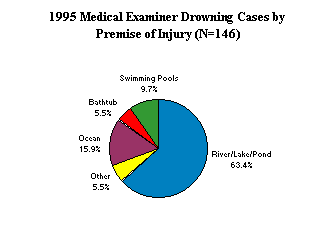
N.C. OCME Annual Report 1995
Back to Annual Report Index | Appendix
Chapter 7: Non-Motor Vehicle Accidents
There were 1116 non-motor vehicle accidental deaths investigated by the Medical Examiner System in 1995. Figure 26 shows that fires, falls, and drownings represent a little more than half (56%) of these deaths. Figure 27 exhibits percentages of alcohol use for each type of accident. Alcohol played a role in a significant percentage of these deaths.
Figure
26
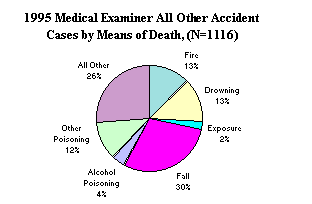
Figure
27
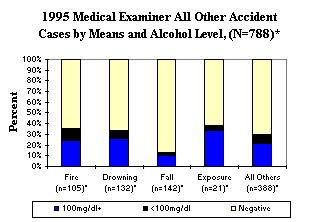
*Total tested for alcohol
Fire
There were 142 accidental fire deaths in North Carolina in 1995. Nonwhite males had the highest death rate and nonwhites in general had double the death rate compared to whites. Fire death rates by age exhibit a U-shaped pattern in which children under 4 and adults over 65 years of age had the highest rates (Figure 28). The highest frequency of fire deaths occurred between December and April.
Figure
28
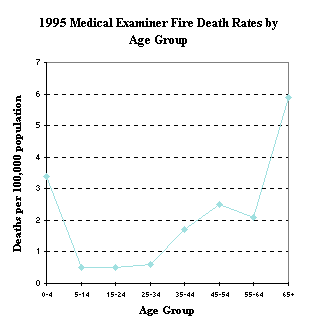
Table 11: 1995 Medical Examiner Fire Death Rates by Race and Sex (per 100,000 population)
| White | Nonwhite | Total | |
|---|---|---|---|
| Male | 1.8 | 5.3 | 2.6 |
| Female | 1.0 | 2.4 | 1.3 |
| Total | 1.4 | 3.7 | 2.0 |
Figure 29 exhibits fire deaths by cause of death. Approximately 89 percent of all fire deaths were in a housefire, and the majority of those deaths were attributed to smoke inhalation.
Figure
29
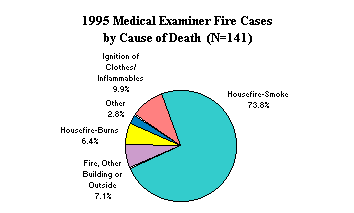
Falls
There were 325 accidental deaths due to falls in 1995. The death rates were the highest for nonwhite males (Table 12). Death rates by age group show an increase with advancing age. Many deaths due to falls occur in elderly individuals who die of complications following a fall that fractures a leg or hip and in whom serious underlying natural disease also play a role. Death due to falls in the elderly are underreported to the Medical Examiner System, which is reflected in the higher death rate in the 65+ age group in vital statistics data (Figure 30).
Figure
30
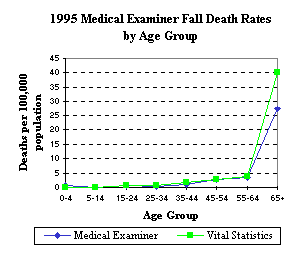
Table 12: 1995 Medical Examiner Fall Death Rates by Race and Sex (per 100,000 population)
| White | Nonwhite | Total | |
|---|---|---|---|
| Male | 5.3 | 3.9 | 5.0 |
| Female | 4.8 | 2.3 | 4.1 |
| Total | 5.0 | 3.0 | 4.5 |
Figure 31 shows fall deaths by nature of fall.
Figure
31
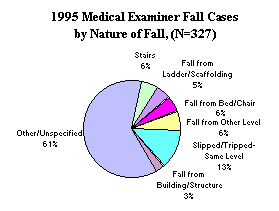
Drownings
There were 150 accidental drowning deaths in 1995. Nonwhite males had the highest death rate and males had a death rate eight times that of females (Table 13). The age groups 0-4 and 35-44 had the highest age-specific death rates (Figure 32). Drowning deaths occurred more frequently in the summer months.
Figure
32
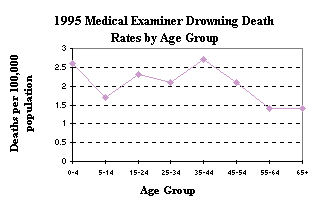
Table 13: 1995 Medical Examiner Drowning Death Rates by Race and Sex (per 100,000 population)
| White | Nonwhite | Total | |
|---|---|---|---|
| Male | 3.0 | 5.9 | 3.6 |
| Female | 0.6 | 0.3 | 0.6 |
| Total | 1.8 | 2.9 | 2.1 |
Figure 33 exhibits drowning deaths by premise of injury. The majority of drownings occur in rivers or lakes. Other studies at the Office of the Chief Medical Examiner have shown that farm pond drownings are especially prevalent in North Carolina.
Figure
33
